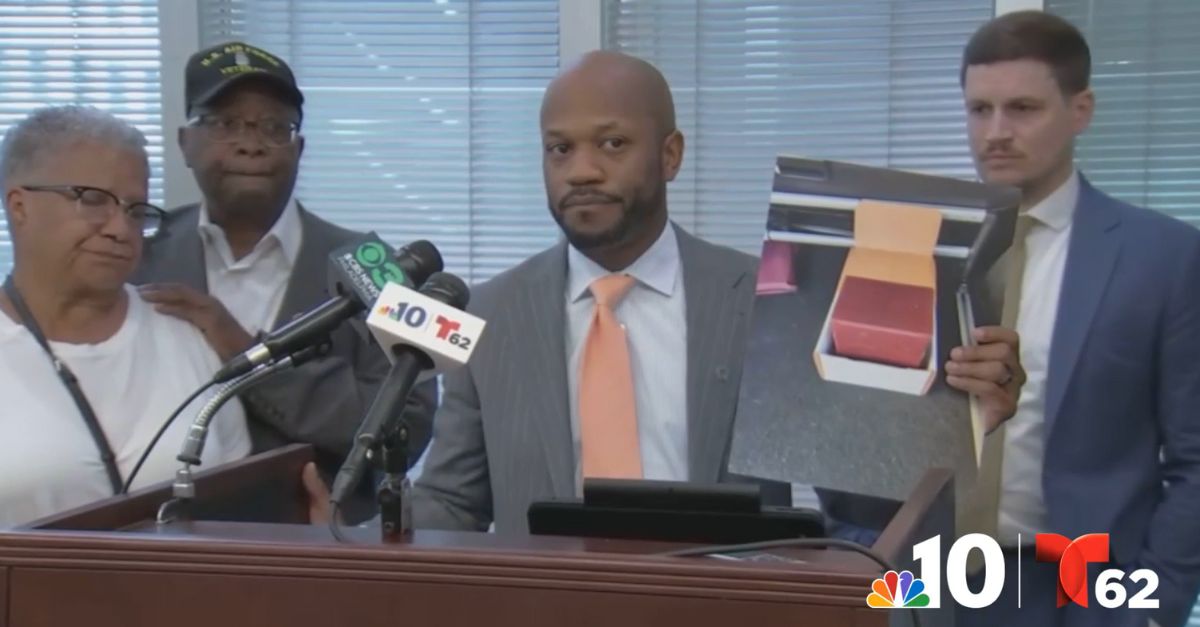Share this @internewscast.com
Background: Abbey Butler (left) and Lawrence Butler (center) hold a press conference in Center City, Penn., with attorney L. Chris Stewart (right) (WCAU). Inset: Timothy Garlington (Stewart Miller Simmons Trial Attorneys).
A couple from Pennsylvania filed a lawsuit against two funeral homes responsible for handling their son’s remains, claiming that they were sent a box containing his brain.
Their son, Timothy Garlington, aged 56, passed away on November 15, 2023. At the time of his death, Garlington was residing in Georgia, which led the Butlers to use Southern Cremations & Funerals in Marietta and Nix & Nix Funeral Home in Philadelphia for his final arrangements.
According to a lawsuit filed in Philadelphia that was reviewed by Law&Crime, the Butlers received a box from Nix & Nix that they were told contained his “personal effects and belongings.” When Lawrence Butler opened a white box, there was another red box inside. While the Butlers were not able to open that box, they noticed that it began to “smell and leak fluids” inside Lawrence Butler’s car.
The lawsuit stated that inside the box was Garlington’s brain. During a press conference at the Wapner Newman law offices in Center City on Thursday, attorney L. Chris Stewart — whose Atlanta-based firm Stewart Miller Simmons Trial Attorneys is representing the Butlers, along with Samuel Anyan, Jr. of Wapner Newman — stated that the “unmarked” white box that was included among Garlington’s personal effects was not part of the inventory list the Butlers received.
Lawrence Butler was emotional as he recalled what happened when he noticed something was wrong in the days following his son’s death. He said, “It was and it is still in my heart, that I got in my car and I smelled death.” He added, “We just pray that this doesn’t ever happen to anyone else again. And it’s just… I had to get rid of that car. I just couldn’t stand the idea that the remains were in that car.”
When asked by a reporter about how Garlington’s brain became separated from the rest of his body, Stewart said that he spoke with other funeral homes about their procedures and came to the conclusion that “there is at no point where the brain is separated from the body in that fashion and shipped in that fashion.”

Attorney L. Chris Stewart holds up a photo of the box that contained human remains belonging to the son of Abbey and Lawrence Butler (WCAU).
When asked about the discovery of the brain inside the box, Stewart said that when the Butlers went to Nix & Nix to retrieve their son’s belongings from the funeral manager, the white box with the red box inside was on the manager’s desk. Abbey Butler unsuccessfully tried to open the box, not knowing what was inside. The Butlers took their son’s belongings, including the box, back to their home, leaving the box in the car.
Days later, Lawrence Butler started to notice that his vehicle started to smell, and the box was leaking some sort of fluid. Stewart said that he took the box inside the home. According to the lawsuit, Lawrence Butler came into direct contact with his son’s brain matter. The couple later learned from the Georgia funeral home, according to Stewart, that the box contained Garlington’s brain “and some mistake had been made.” He said the box “never should have been given to them.”
Stewart said that the box containing the brain was returned to Nix & Nix. According to a reporter at the press conference, Nix & Nix said that an investigation was being conducted, but Stewart was not aware of one. Local NBC affiliate WCAU reported that the state board cleared Nix & Nix of wrongdoing, and the Philadelphia-based funeral home was not aware of what was in the box.
Stewart stated that the Butlers have not received an apology from either funeral home, nor did they provide an explanation. Law&Crime reached out to Southern Cremations & Funerals and Nix & Nix Funeral Home but did not receive an immediate response.
The Butlers are suing both funeral homes for negligence and intentional infliction of emotional distress. They are seeking punitive and compensatory damages for “willful misconduct, malice, and a complete lack of care, dignity and respect.”















